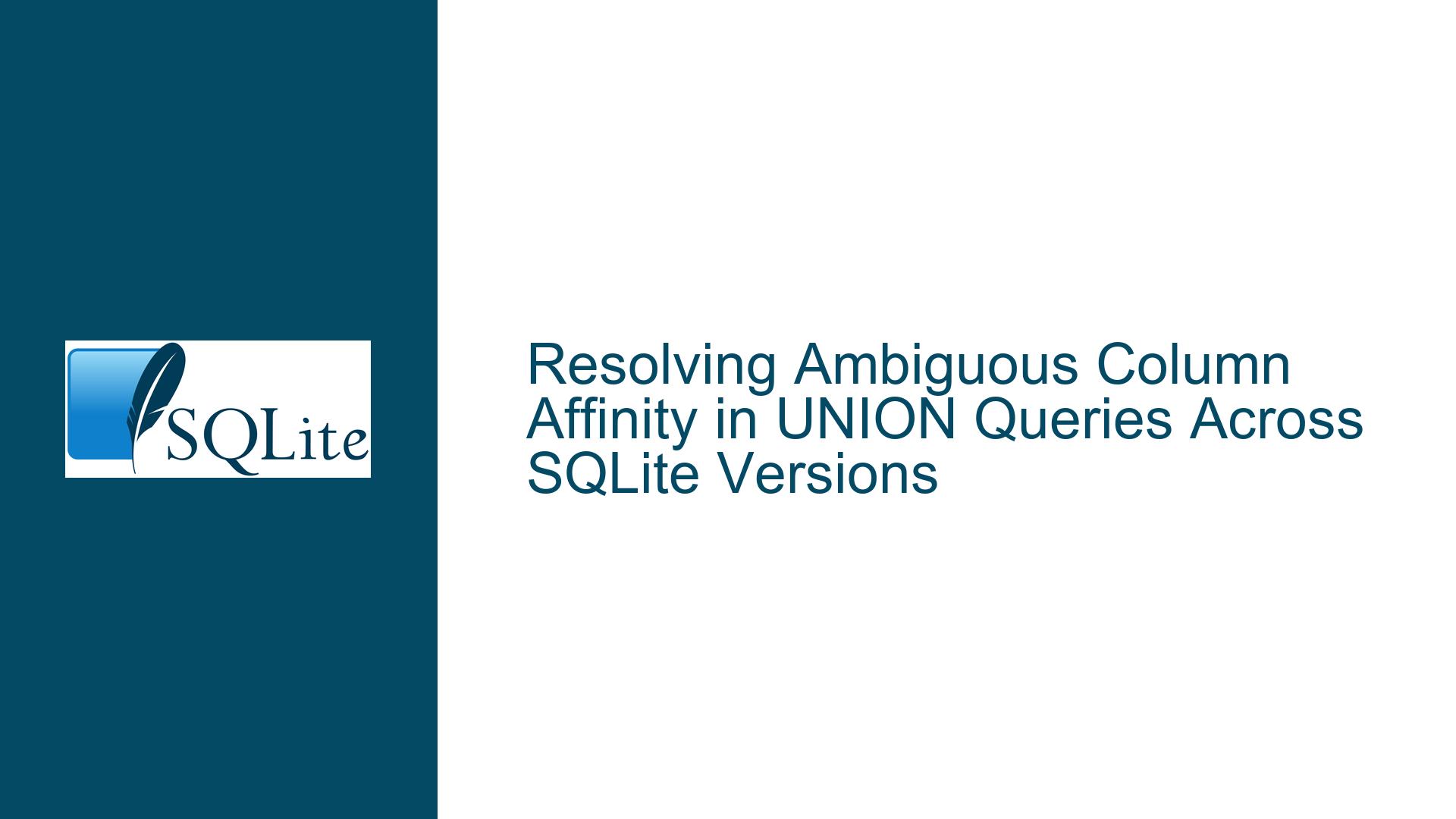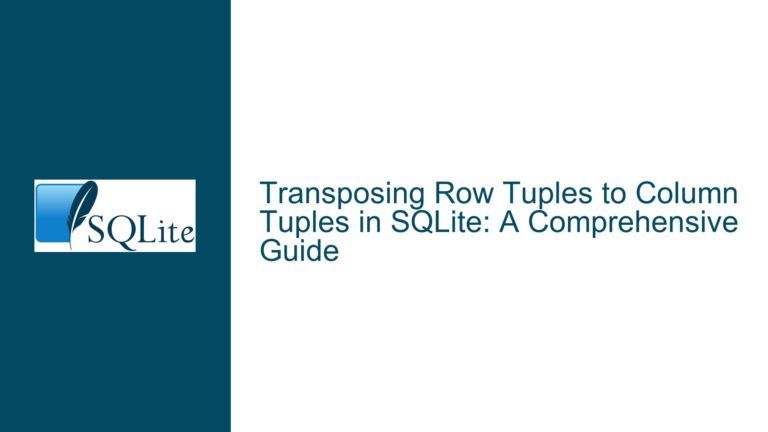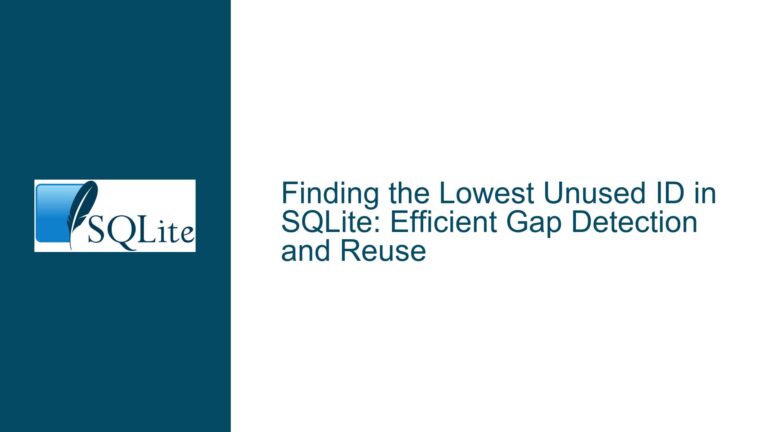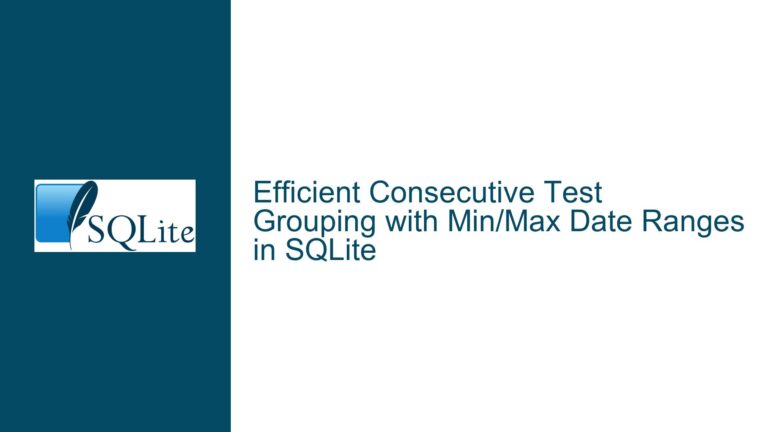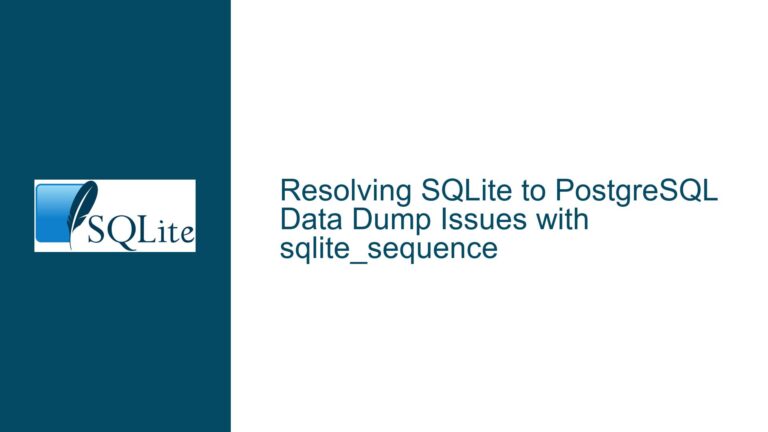Resolving Ambiguous Column Affinity in UNION Queries Across SQLite Versions
Understanding Column Affinity Mismatches in UNION-Based CTEs Leading to Type Comparison Failures
Root Cause: Column Affinity Inconsistencies in UNION-Connected SELECT Statements
The core issue stems from a change in how SQLite 3.43.0 handles column affinity determination in compound queries (e.g., UNION ALL) compared to version 3.35.5. This manifests specifically in Common Table Expressions (CTEs) where columns derived from UNION ALL operations exhibit different type handling behaviors between SQLite versions. The problem becomes acute when comparing numeric values stored as TEXT with integer literals or columns, where implicit type conversion rules have shifted due to altered column affinity assignments.
In SQLite versions prior to 3.43.0, when a column in the first SELECT of a UNION ALL was explicitly typed (e.g., via CAST(NULL AS VARCHAR(256))) and subsequent SELECTs provided values with different implicit affinities (e.g., SUBSTR() returning TEXT), the resulting column affinity was sometimes incorrectly propagated as TEXT. This allowed comparisons like ‘0’ = 0 to evaluate as TRUE through automatic type conversion. Starting with version 3.43.0 (specifically commit 27655c9353620aa5), SQLite rigorously applies "blob" affinity to columns where constituent SELECT statements disagree on affinity, breaking such comparisons unless explicit type harmonization is implemented.
Critical Factors Behind Affinity-Related Query Breakage
Ambiguous Affinity Resolution in Compound Queries
When columns in UNION ALL components have conflicting affinities:- Pre-3.43.0: Used "affinity aggregation" favoring TEXT if any component had explicit typing
- Post-3.43.0: Defaults to BLOB affinity when affinities conflict, disabling numeric conversion
Example from the CTE:
-- First SELECT: CAST(NULL AS VARCHAR(256)) → TEXT affinity -- Second SELECT: SUBSTR(...) → TEXT value but NO EXPLICIT AFFINITYPrior versions treated the entire column as TEXT affinity, enabling ‘0’ vs 0 comparisons. New versions treat it as BLOB affinity, requiring strict type matches.
Implicit Type Conversion Rule Changes
SQLite applies different comparison rules based on column affinity:- TEXT Affinity: Converts RHS values to TEXT before comparison
- BLOB Affinity: Uses storage classes directly without conversion
- NUMERIC Affinity: Converts LHS to numeric if possible
The CASE expression
cte_ParseClKey.PstCl1ClKey = COALESCE(CL_KEY,0)behaves differently because:- In 3.35.5: PstCl1ClKey had TEXT affinity → 0 converted to ‘0’ for comparison → ‘0’ = ‘0’ → TRUE
- In 3.43.0: PstCl1ClKey has BLOB affinity → Compare TEXT ‘0’ vs INTEGER 0 → FALSE
Schema vs Expression-Based Typing Discrepancies
Columns created via expressions like SUBSTR() inherit "no affinity" unless explicitly CAST(). UNION ALL compounds this by merging affinity-less columns with explicitly typed ones, creating ambiguity that SQLite now resolves conservatively as BLOB.
Comprehensive Remediation Strategy for Cross-Version Compatibility
Step 1: Affinity Harmonization in UNION Components
Force consistent affinity across all SELECT statements in UNION ALL clauses:
-- Original problematic CTE:
CAST(NULL AS VARCHAR(256)) AS PstCl1ClKey -- TEXT affinity
...
SUBSTR(...) AS PstCl1ClKey -- No explicit affinity
-- Fixed version:
CAST(SUBSTR(...) AS TEXT) AS PstCl1ClKey -- Explicit TEXT affinity
Apply this pattern to all UNION ALL components to ensure uniform column affinity.
Step 2: Type-Safe Value Comparisons
Replace implicit type-dependent comparisons with explicit casting:
-- Before:
CASE WHEN cte_ParseClKey.PstCl1ClKey = COALESCE(CL_KEY,0) THEN 1 ELSE 0 END
-- After:
CASE WHEN CAST(cte_ParseClKey.PstCl1ClKey AS INTEGER) = COALESCE(CL_KEY,0) THEN 1 ELSE 0 END
Step 3: Systematic Affinity Auditing Across Queries
Create an affinity verification harness using temporary schema inspection:
-- For each UNION-based CTE/view, check affinity consistency
SELECT sql FROM sqlite_master WHERE sql LIKE '%UNION ALL%';
-- Manually inspect each match for:
-- 1) Explicit CAST() in some but not all UNION components
-- 2) Columns derived from functions (SUBSTR(), etc.) without CAST()
-- 3) JOIN conditions comparing columns with potential affinity mismatches
Step 4: Version-Specific Query Optimization
Implement conditional SQL execution based on sqlite_version():
SELECT sqlite_version() AS v;
-- In application code:
IF version < '3.43.0' THEN
USE legacy_query
ELSE
USE affinity_aware_query
Step 5: Automated Regression Testing Setup
Create test cases that validate type comparison behavior across critical queries:
-- Test case template
WITH test_data (text_val, int_val) AS (
SELECT '0', 0 UNION ALL
SELECT '1', 1 UNION ALL
SELECT 'abc', NULL
)
SELECT
text_val,
int_val,
CASE WHEN text_val = int_val THEN 1 ELSE 0 END AS implicit_compare,
CASE WHEN CAST(text_val AS INTEGER) = int_val THEN 1 ELSE 0 END AS explicit_compare
FROM test_data;
Step 6: Pragma-Based Affinity Enforcement
While SQLite doesn’t support direct affinity setting, create views with enforced typing:
CREATE VIEW typed_cte_ParseClKey AS
SELECT
OrderTypeClKey,
CAST(SalesTeamId AS INTEGER) AS SalesTeamId,
...,
CAST(PstCl1ClKey AS TEXT) AS PstCl1ClKey -- Force affinity
FROM cte_ParseClKey;
Step 7: Query Plan Analysis for Implicit Conversions
Use EXPLAIN to detect potential type mismatch operations:
EXPLAIN
SELECT ... WHERE text_column = numeric_value;
-- Look for:
-- ApplyAffinity(...) → Indicates conversion attempts
-- If missing in 3.43.0+, reveals broken conversions
Step 8: Migration to Strict Typing Paradigm
Adopt explicit type declarations throughout the schema:
- Replace all VARCHAR(n) with TEXT
- Use CAST() consistently in CTEs
- Avoid NULL casts without explicit types: CAST(NULL AS INTEGER)
Step 9: Proactive Affinity Documentation
Maintain an affinity matrix for critical columns:
| Column | Source CTE | Affinity 3.35.5 | Affinity 3.43.0+ | Remediation Action |
|---|---|---|---|---|
| PstCl1ClKey | cte_ParseClKey | TEXT | BLOB | CAST to TEXT in UNION |
| SalesTeamId | cte_ParseClKey | INTEGER | INTEGER | None required |
Step 10: Monitoring Future SQLite Changes
Subscribe to SQLite’s changelog notifications with particular attention to:
- Affinity determination algorithms
- UNION/compound query handling
- Implicit type conversion edge cases
This rigorous approach ensures queries behave consistently across SQLite versions by eliminating reliance on implicit type conversions and ambiguous affinity resolution. The key is enforcing explicit typing at all compound query boundaries and implementing systematic affinity validation across the codebase.
